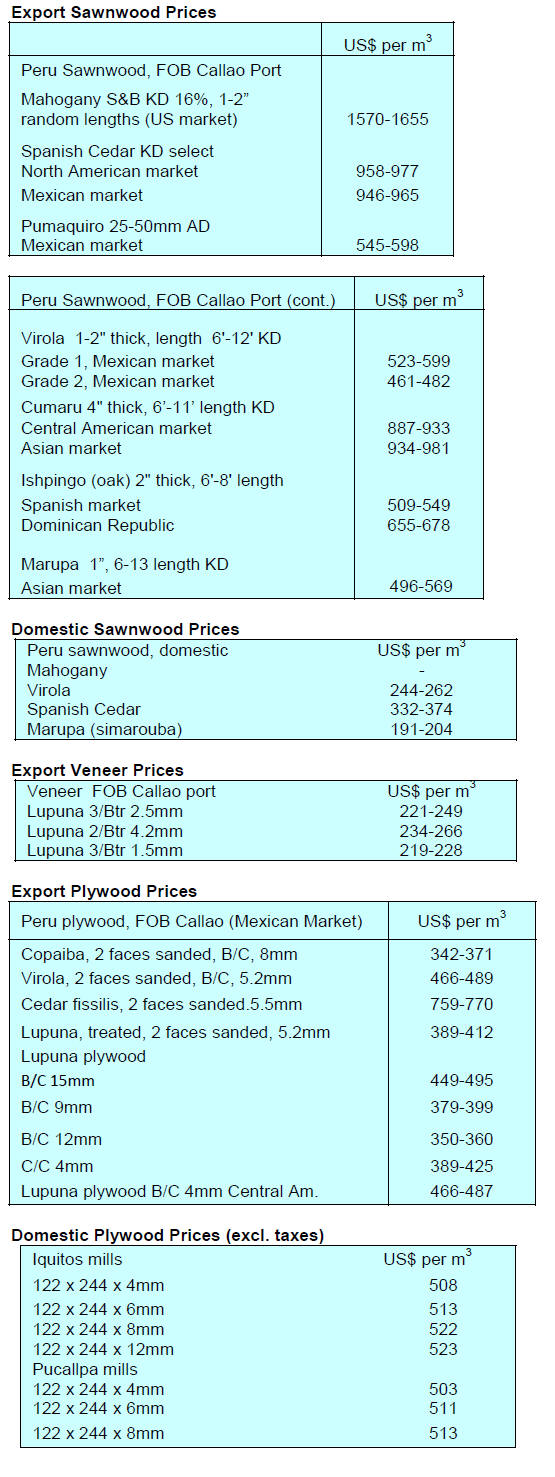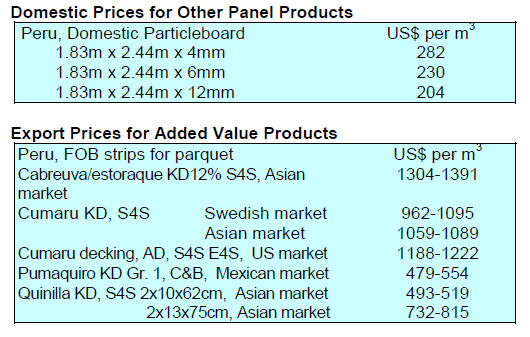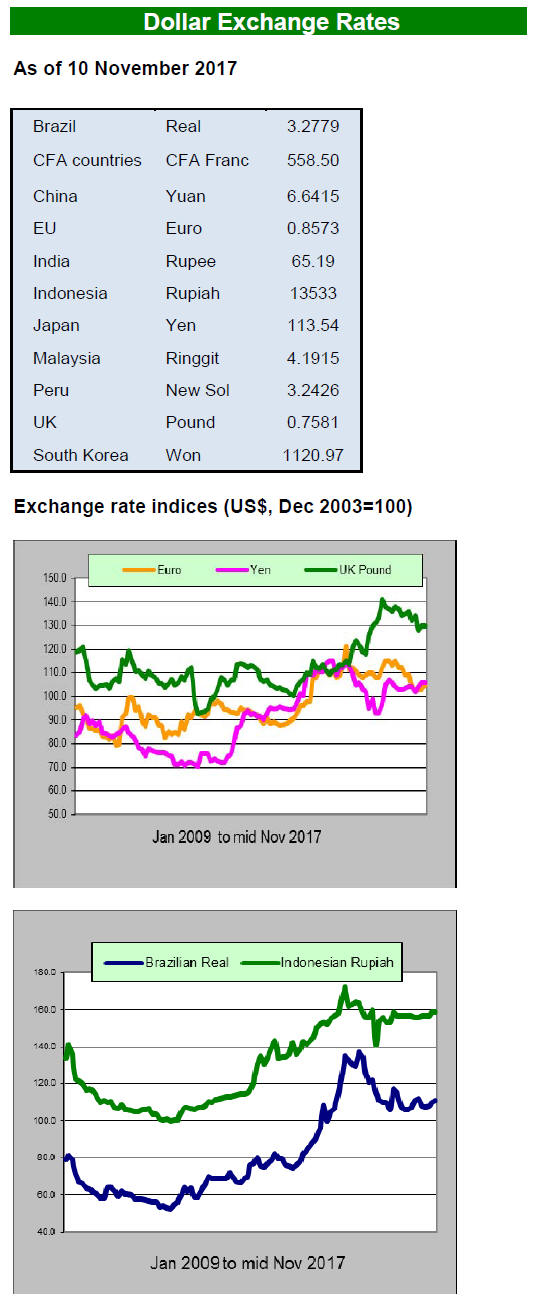2. GHANA
Industries to enjoy reduced power rates
Ghanaian industries, including timber manufacturing
companies, could benefit from reduced electricity tariffs if
the budget submission from Ken Ofori-Atta, the Minister
of Finance is accepted. The Vice President, Dr. Bawumia,
has hinted at a 25% reduction in power tariffs aimed at
accelerating industrialisation.
Dr. Bawumia recently told an international conference that
the government had shifted its focus from taxation to
production and is working to create an industrial
environment that focusses on technology as one tool for
growth.
At an Association of Ghana Industries (AGI) awards
event, Ghana’s President confirmed that efforts are
underway for a review of electricity tariffs. AGI President,
James Asare-Adjei, welcomed the move by the
government to address the power crisis in the country as it
will pave the way to restore economic stability and an
improvement in the business environment.
The AGI has been lobbying for a change in the high
electricity tariffs paid by local manufacturing companies.
The unreliable supply of electricity was the biggest
challenge faced by local manufacturers as it undermined
competiveness.
Strengthen financial sector for economic growth
Bank of Ghana Governor, Dr. Ernest Addison, has said the
Bank aims to create a stronger and more sophisticated
financial sector to meet the needs of the domestic private
sector and provide a boost to attracting investment from
overseas.
He said the Bank will build on policies to attain macroeconomic
stability which is critical if the country’s
economic growth is to be maintained.
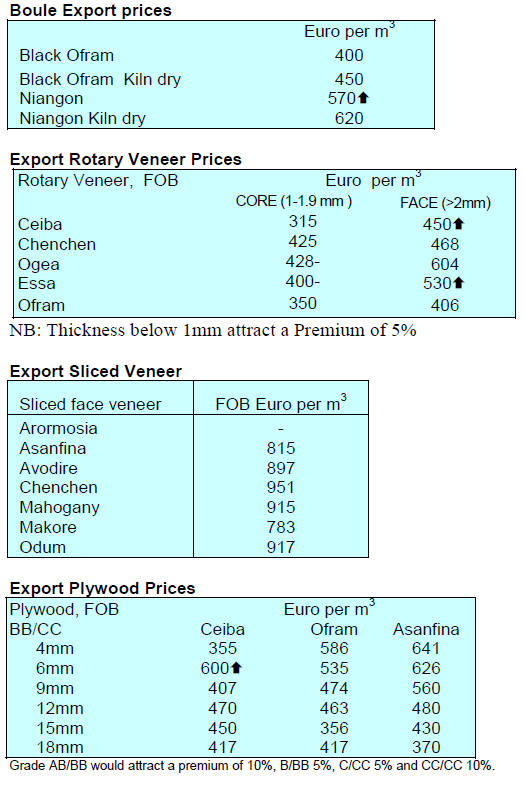
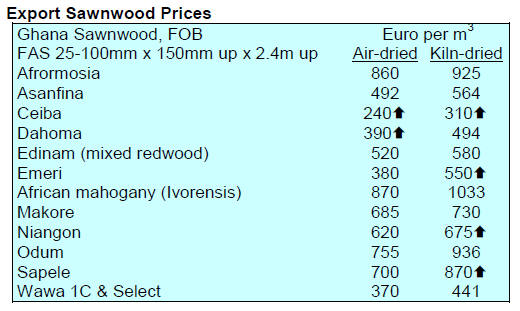
3.
MALAYSIA
Exports on track for a record high
Malaysia’s Ministry of Plantation Industries and
Commodities says exports of wood products are forecast
to rise to RM23 billion this year, up from the RM21.86
billion last year.
Nasrun Datu Mansur, the Deputy Minister said the
government will do all it can to develop the talent of
Malayasian wooden furniture manufacturers as the sector
is of importance to the economy. In the first eight months
of this year wood product exports rose 7% year on year to
almost RM16 billion.
SMEs to be offered soft loans for automation
Malaysia’s 2018 budget will, for the first time, deliver
support through a loan facility for expanded automation in
small and medium-sized enterprises.
The President of the Malaysian Furniture Council, Chua
Chun Chai, welcomed this initiative saying one way
around the acute labour shortage in the furniture making
sector is automation. He said many furniture factories
were keen to automate production to minimise dependence
on foreign workers and improve productivity.
Chua said if the furniture industry can boost productivity
through greater levels of automation then Malaysian
exporters will be better equipped to meet the competition
from countries like China, Vietnam and Indonesia. The
president of the Johor Furniture Association, Koh Choon
Chai, said furniture manufacturers were struggling to meet
export orders on time because of a shortage of workers.
Third party verification of certification in Sarawak
The state government has indicated it will make it
mandatory for all timber concessions in Sarawak to obtain
forest management certification in order to enhance
sustainable forest management in the state.
Deputy Chief Minister, Awang Tengah Ali Hasan, said the
state government has strengthened the Sarawak Timber
Legality Verification System (STLVS) by providing a
formal standard to include independent third party
verification.
He also said his ministry aims to reduce reliance
on the
natural forests for raw materials through the establishment
of a viable and robust industrial forest estate in the state.
Off-site fabrication mandatory for government projects
The recent International Conference on Wood
Architecture, hosted by the Malaysian Timber Council
(MTC), delivered the message that a magnificent building
material like timber should not be reduced to secondary
functions and that Malaysian architects as well as
structural engineers need to relook the use of timber in
architecture.
In an opening address stakeholders in the construction
industry were urged to embrace the concept of
industrialised building systems whereby components, such
as timber frames, are fabricated off-site to improve
productivity and reduce onsite construction waste. For
government funded construction projects there is a
minimum level of mandatory off-site fabrication.
For more see:
http://www.mtc.com.my/images/media/555/20171109_WA2017
_Post_release-eng.pdf
Plywood prices in October
Plywood traders based in Sarawak reported the following
export prices:
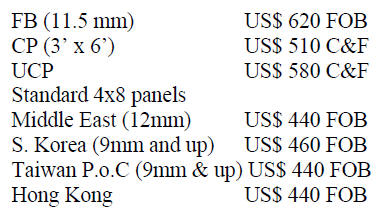
4.
INDONESIA
Bright prospects in furniture
markets says Ministry
Panggah Susanto, Director General of Agro Industries
within the Ministry of Industry (Kemenperin), is on record
as saying within two years furniture exports could rise to
US$5 billion as demand in the United States, Japan, and
Western Europe picks up.
Currently the value of annual furniture exports is US$1.7
billion.
Much of the furniture exported from Indonesia is made
from rattan and Paggah said rattan furniture production
will be increased.
Kemenperin noted employment in the formal segment of
the domestic furniture industry in 2016 was around
101,000 but this could double in a few years.
To boost rattan furniture production the Ministry of
Industry is encouraging development of the furniture
industry as it is a labour intensive sector and has decided
to make Cirebon, a port city on the north coast of Java,
one of the main centres for rattan supply and rattan
furniture and handicraft production.
In contrast to the positive outlook from the Ministry of
Industry, the Chairman of Association of Indonesian
Furniture and Handicraft Industry (Asmindo) Mugiyanto
said furniture manufacturers are facing challenges in
international markets where sales of Indonesian furniture
face tough competition and suffer from a poor image due
to perceptions that illegal timber is being utilised.
Mugiyanto said to expand sales manufacturers need to be
deliver innovative product designs and to expand outreach
to address the negative perceptions of Indonesian wood
products in international markets.
In the current trading environment Asmindo has suggested
a focus on the domestic market as the building sector is
very active with huge investments in family homes,
apartments, hotels and office buildings where furniture
will be needed.
Policy for forest-based energy needed
Haruni Krisnawati, from the Forest Research and
Development Center, Ministry of Environment and
Forestry, said the utilisation of renewable energy based on
forest resources can support Indonesia’s efforts on to cut
greenhouse gas emissions.
However, little progress will be made until the government
has a defined policy to support this. What is needed, says
Haruni, is a policy on competitive tariffs for electricity
from renewable sources.
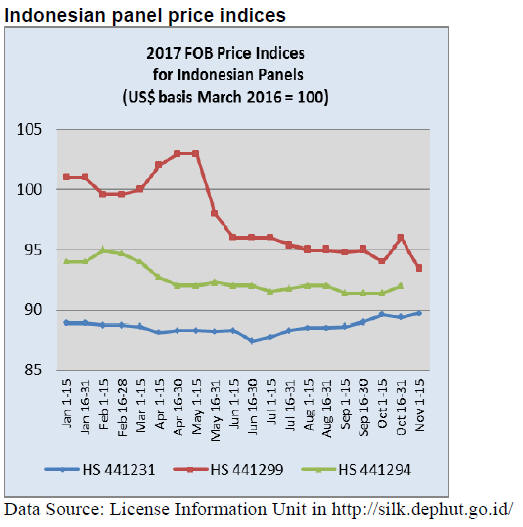
Ministry to expand community forests
management
The Ministry of Environment and Forestry has targeted the
allocation of 5 million hectares of social forestry from now
until 2019. Currently the area of allocated to social
forestry is only 1.07 million ha but this is expected to rise
when full 2017 data is available.
In related news, the Indonesian President granted
customary forest management rights to nine village forest
management units covering an area of 80,230 hectares and
promised technical help and financial support for the
recipient communities.
5.
MYANMAR
Myanmar millers lobby MTE to sell logs in
local
currency
In a letter to the Myanma Timber Enterprise (MTE)
national sawmillers are urging that bids in tender sales be
permitted in Myanmar kyats. This proposal was included
in a letter submitted by the Myanmar Forest Products
Merchants Federation (MFPMF) to the Vice President. In
the same letter the MFPMF also asked for separate tenders
only for Myanmar national manufactures.
The MTE accepts US dollars for some sales and kyats for
others which causes confusion. Domestic companies can
pay in kyats but when these millers tried to export
products from logs purchased in kyats they ran into trouble
as traceability was said to be weak which resulted in the
Forestry Department suspending export of wood products
milled from logs purchased with kyats.
Exports dip as confidence of international buyers has
been undermined
From 1 April to 3 November 2017 the value of timber
exports amounted to US$4.1 million down sharply on
recent years. Analysts say the recent action by authorities
in Denmark and Netherland has undermined the
confidence of importers and this is reflected in the level of
exports.
MTE clarifies export documentation
The MTE has issued a document “The Current Situation of
the MTE and the Future Plans and Documentation for
Myanmar Timber export.
See:
https://drive.google.com/file/d/0B7YRHkC0qQmak83X3ZJTENhcXM/
view)
This attempts to clarifying what documents will be
provided to importers and how they can be interpreted.
MTE is making this effort in order to satisfy the demands
of importers especially those in the EU who are required
to satisfy the EUTR.
Myanmar seeks PEFC membership
A delegation from the Myanmar Forest Certification
Committee (MFCC) attended the PEFC General Assembly
in Helsinki and formally declared their intention to be a
PEFC member within three years.
MFCC and PEFC are undertaking a three-year project
supported by the Prince Albert II of Monaco Fund to
strengthen MFCC as an institution and to strengthen the
Myanmar Forest Certification System (MFCS) as the
National Certification System.
This, say analysts, will contribute the mitigation of risk in
Myanmar’s forestry and timber industry sectors.
Aim to have forestry sector included in EITI
negotiations
Myanmar’s most recent economic policy identifies the role
that satisfying the requirements of the Extractive
Industries Transparency Initiative (EITI) can play in
assuring transparent natural resource governance.
The extractive sector in Myanmar makes a significant and
growing contribution to the country’s GDP and U Tin Tin,
leader of EITI working group in the Forestry Department,
told the local media that discussions are underway to have
the forest sector assessed independently in readiness for
further discussion with EITI.
It is anticipated that assessment of the forestry sector for
the EITI will demonstrate improvements in transparency
and the growing cooperation between the Forestry
Department, the private sector and civil society. The
ultimate aim is to strengthen the international image of the
Myanmar forestry sector.
For more see:eiti.org/myanmar
India and Myanmar promote bilateral relations
A recent workshop “India-Myanmar relations: “The Way
Forward" organised jointly by the Calcutta-based Institute
of Social and Cultural Studies (ISCS) and the Yangonbased
Myanmar Institute of Strategic & International
Studies (MISIS) highlighted trade between India and
Myanmar and reported that this had doubled to over US$2
billion over the past 10 years.
Participants called on both countries to work towards
removing obstacles to trade through
addressing connectivity, infrastructure, labour movement,
logistics and complementary financial services. This last
point is particularly relevant as at present most
international transactions between India and Myanmar are
through Singapore. The meeting called for the authorities
in Myanmar to modernise its banking sector.
The workshop also recommended the creation of Special
Economic and Industrial Zones along main road arteries
linking the two countries.
A 19 point action plan was adopted which can be found at:
http://www.mizzima.com/development-news/yangondeclaration-
india-myanmar-cooperation
Encourage investment in Myanmar’s inland waterways
Earlier this year the government announced plans to
develop six inland maritime port terminals – four on the
Ayeyarwaddy River and two on the Chindwin River.
The Ayeyarwaddy ports will be built at Mandalay,
Pakkoku, Sinkham and Magway, while the Chindwin ports
will be located at Kalewa and Monywa.
Myanmar’s Minister of Transport and Communications,
U
Thant Sin Maung, said that the government is encouraging
private investment in infrastructure is key to the National
Transport Master Plan.
In support of the Minister, U Phyo Min Thein, Chief
Minister of the Regional Government of Yangon, said it is
a priority to upgrade the infrastructure including the
development of inland waterways.
According to estimates from the Ministry of Transport and
Communications, the transport sector will require
investments of over US$50 billion over the next 20 years
and investments in inland port developments can deliver
attractive returns.

6. INDIA
Gabon okoume veneers gain a foothold
in India
The Indian panel sector journal, Ply Reporter in its
October issue, says okoume face veneer shipped from
Gabon has gained a foothold in the Indian panel market
and is gradually gaining acceptance in the Indian market.
Ply Reporter predicts that the supply of okoume veneer
from Gabon is set to rise.
In the past plywood manufacturers in India could rely on
imported raw materials from forest rich countries such
Myanmar, Laos, Indonesia, Solomon Islands, Papua New
Guinea and West/Central African countries. But now
many of these countries have restricted log exports and
even veneers in some cases.
Given some regulatory changes in the forestry sector by
the Governments of Myanmar and Laos the supply of face
veneers to India is severely impacted so Indian plywood
manufacturers welcome the production and export of
veneers from Gabon.
Recently, one of India’s leading plywood manufacturers,
Greenply, began veneer production in Gabon alongside the
other Indian owned mills operating in the country’s
Special economic Zone.
For more see:
http://www.plyreporter.com/
Job opportunities in the real estate sector jobs set to
rise
A New report from CREDAI, the Confederation of Real
Estate Developers Associations of India, says real estate
sector employment is set to increase by 80% by 2025.
CREDAI commissioned the study “Assessing the
Economic Impact of India’s Real Estate” with CBRE
(consultants to the real estate sector) to assess the impact
of economic such as the new Goods and Services tax on
the real estate sector.
Potential employment opportunities in the sector are
expected to rise to 17.2 million jobs by 2025 up from 9.2
million in 2016. The economic contribution of the real
estate sector is projected to increase significantly during
the period from 6.3% in 2016 to almost 13% in 2025.
Increasing demand for new housing, especially in the socalled
tier II and tier III cities in the country, will be the
drivers of real estate growth says the report. However, the
increase in contribution to the economy is, says the report,
subject to an effective implementation of relevant policy
measures to resolve bottlenecks bothering the sector.
For more see:
https://credai.org/press-releases/credai-steps-in-to-resolvecomplaint-
of-ncr-home-buyers
Imported plantation teak
Demand for imported plantation teak logs continues to be
satisfactory. Pressure for a revision of GST on wood and
wood products continues. In the absence of a decision on
the GST Indian importers are reluctant to commit too far
ahead and are only willing to maintain current price offers
to suppliers.
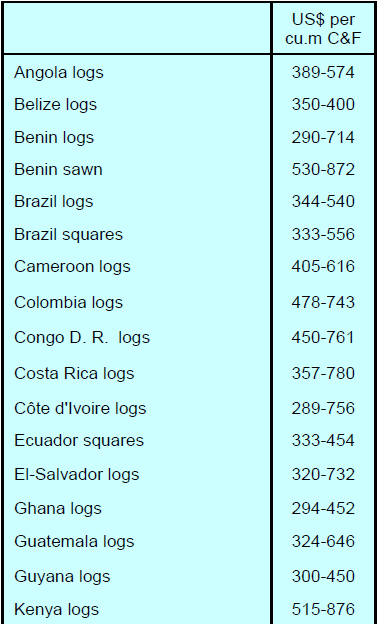
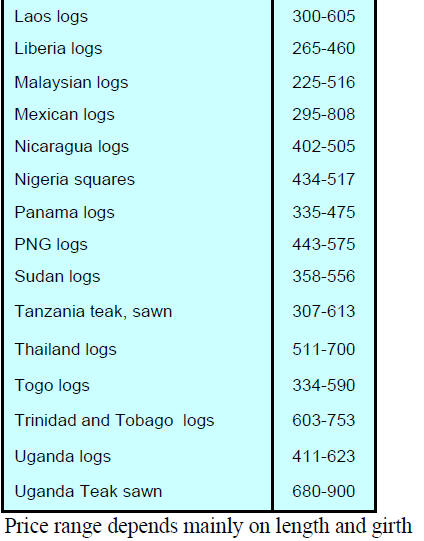
Locally sawn hardwood prices
Prices for imported hardwoods remain unchanged. Traders
report demand is firming as hardwoods begin to take
market share from imported teak where quality has been
declining in recent months.
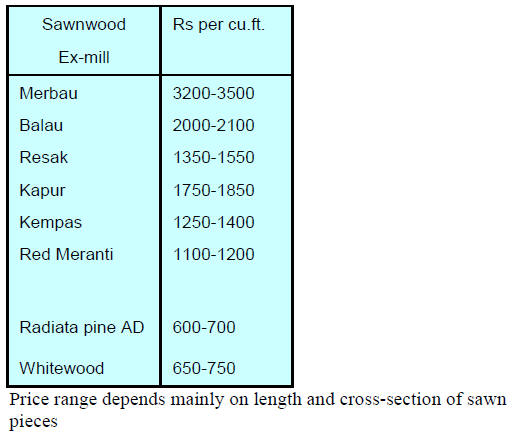
Importers say the availability of sawn Myanmar teak is
satisfactory but that domestic sales are flat because the
price of Myanmar teak is high compared to alternative
hardwoods.
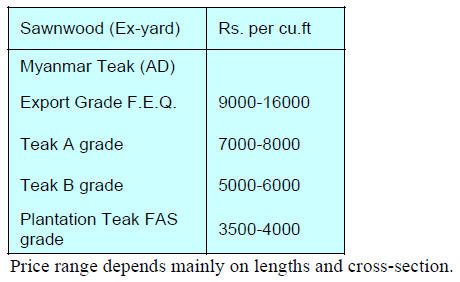
Prices for imported sawnwood
Prices for imported sawnwood (KD 12%) remain
unchanged.
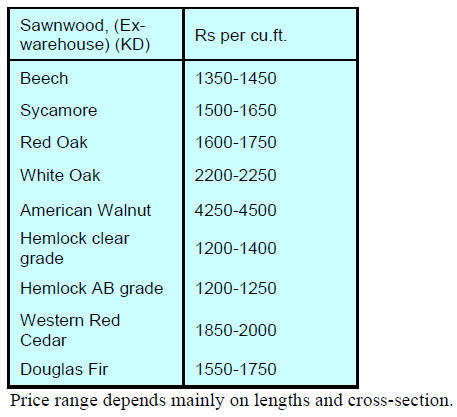
Prices for WBP marine grade manufactured by
domestic mills
At its 23rd meeting the GST Council almost 200 items
were shifted from the upper tax bracket of 28% to 18%.
Amongst the items which will enjoy a lower GST are
plywood and panel products.
This has been welcomed by manufacturers who have
lobbied strongly for a lower tax.
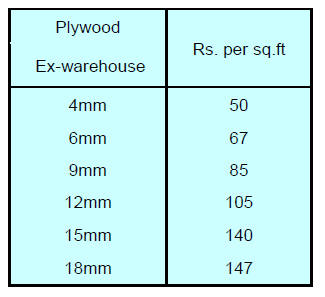
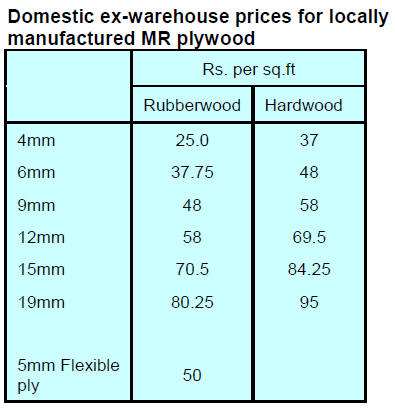
7. BRAZIL
Furniture production increases
in Southern Brazil
Rio Grande do Sul and Paraná states are two prominent
furniture centres in Brazil and according to IBGE
(Brazilian Institute of Geography and Statistics), furniture
production in Rio Grande do Sul state in August expanded
just over 10%. In the Paraná state the equivalent growth
was almost 5%. Year on year, production in Rio Grande
do Sul increased 2.2%, while that in Paraná rose 11.6%.
Wood-plastic panel production from wood residues
Early work on the production of a wood-plastic panel in
the state of Amazonas has been encouraging. Trial
production has utilised timber residues.
This value added product from residues of Amazonian
timber offers an opportunity to expand the range of wood
based panels available in the market.
Furniture exports increase
Data from the Ministry of Development, Industry and
Foreign Trade (MDIC) show the trend in furniture exports
in the first nine months of this year in comparison with the
same period of 2016.
From January to September 2017 furniture exports
amounted to US$456.9 million against US$ 432.1 million
in 2016. Looking ahead, the MDIC expects total exports
for 2017 to be around US$660 million. Brazilian
contribution to the global furniture trade of about US$270
billion is around 0.25%.
The trade balance in the furniture sector continues positive
as imports have been falling reflecting the state of the
economy.
Between January and September 2017 furniture imports
totalled US$398 million, down 14% year on year. Brazil
imported furniture from China worth US$124 million,
down 6% compared to the first nine months of 2016.
Huge reforestation initiative in ‘Arch of Destruction’
Conservation International (CI) along with the World
Bank, the Brazilian Ministry of Environment, the Brazilian
Biodiversity Fund, the Global Environment Fund and the
"Living Amazon" will begin a major planation effort in the
Amazon region known as the Arch of Destruction.
This area encompasses large parts of Rondônia, Pará,
Acre, Amazonas and the Xingu basin areas considered
most seriously affected by deforestation for cattle
ranching. It has been reported that around 70,000 hectares
will be planted.
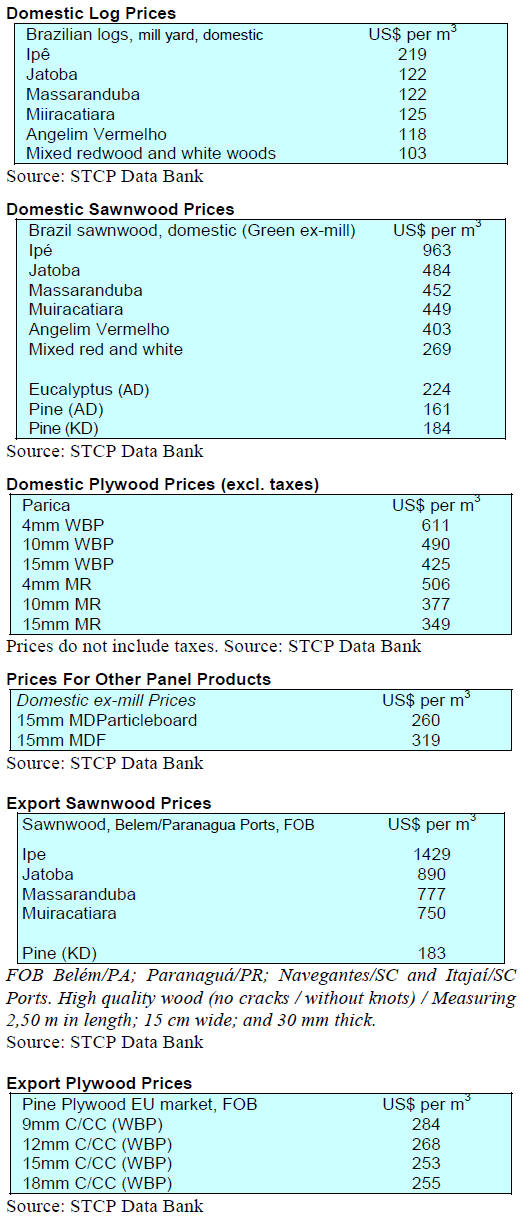

8. PERU
Exploring new export
opportunities
Through a cooperative effort the Tambopata and
Tahuamanu Export Consortiums in the Madre de Dios
region and Tropical Forest Business EIRL, a consulting
firm, work has begun to seek international marketing
opportunities.
The aim is to improve the levels of competitiveness of
products manufactured in the Madre de Dios region and
identify potential markets.
In the first week of November the Tropical Forest team
completed an assessment of the Dominican market, an
important consumer of solid wood products, especially
precious wood of tropical origin such as that produced by
Peru.
Information on major Dominican timber importers and
their buying trends will be used to develop a marketing
plan. The initial survey suggests there is demand for
species such as cachimbo, ishpingo, congona, quillosisa
and interest in others such as sapotillo and misa. There is
also a growing demand for decking particularly in the
main tourist centres.
Strengthen skills of professionals in Iquitos
Around 30 forestry professionals will be selected to
participate in a second course "Supervision, Use and
Conservation of Forest Resources", organized by the
Forestry and Wildlife Resources Oversight Agency
(Osinfor), together with the National University of the
Amazon (UNAP).
The purpose is to strengthen the skills of professionals
through training and shared experience in the forestry
sector as well as to train professionals responsible for
monitoring forest resources and wildlife. Emphasis will be
placed on supervisory methodologies and the collection of
field information.
Plan for planting 10 million seedlings
Within the framework of the National Forestry Week, the
Ministry of Agriculture and Irrigation (Minagri) and
authorities in five regions (Apurímac, Ayacucho, Ica,
Huancavelica and Junín) launched their plan to plant 10
million seedlings from now until 2018.
Planting began the first half of November in the town of
José María Arguedas, Apurímac region where the
authorities and communities actively participated by
planting the first million seedlings in the five regions.
The species planted are mainly pine, teak and eucalyptus.
